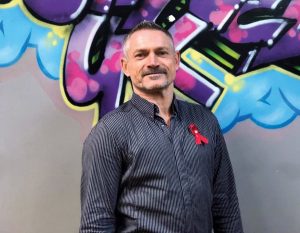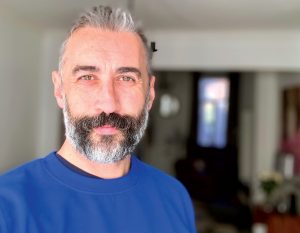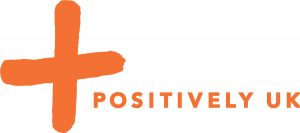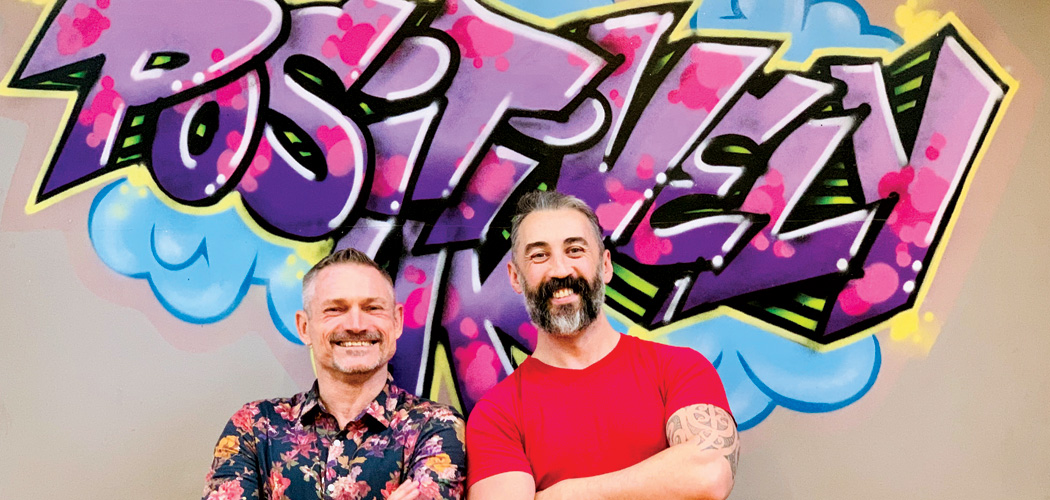Positively UK provides peer-led support groups, advocacy and information to everyone living with HIV to manage any aspect of their diagnosis, care and life with HIV. We asked Positively UK’s Interim CEO Garry Brough and its Gay Men’s Coordinator Chris O’Hanlon to tell us how peer support has a role in the elimination of HIV.
Positively UK’s Interim CEO Garry Brough has been living with HIV for 28 years and working in HIV peer support for the last 20 years.

It’s that time of the year again, when the red ribbons come out and we are reminded that HIV has not gone away. But while World AIDS Day may seem to some like an outdated reminder of the ‘bad old days’ in these times of effective treatment, HIV awareness is as important as ever. Although the possibility of ending the epidemic is clearly within reach, knowledge about HIV has decreased over the years, despite, or perhaps because of the fact that the news is so good.
Earlier this year London joined the global Fast-Track Cities Initiative, which has the aim of reaching UNAIDS’ 90-90-90 goals – that 90% of people with HIV are diagnosed, 90% of those are accessing care and 90% of those taking effective treatment have an undetectable viral load.
Achieving these goals can reverse the course of the HIV epidemic and with London already exceeding this target, we have seen significant reductions in new infections and diagnoses over the last few years. So London’s commitment to the Initiative has been to set ambitious goals of getting to zero HIV stigma, transmissions and deaths by 2030. We are witnessing the turning point in the HIV epidemic, with the potential of being the generation that sees the end of HIV as a public health crisis.

This is genuinely achievable, if we all engage openly with the subject of HIV and support each other with knowledge and confidence, rather than fearing the unknown. Increased access to PrEP for people who are anxious about contracting HIV, and the knowledge that someone living with HIV who is on treatment with an undetectable viral load cannot pass on the virus, are both game changers in reducing anxieties about HIV transmission. Yet many people either don’t know this or don’t feel confident discussing it, because they continue to fear or experience judgement and rejection for raising the topic of HIV. Boosting knowledge and confidence are primary objectives for our staff and trained volunteers, who provide peer support in HIV charities and clinics across the country via our peer mentor training programme, Project 100 (positivelyuk.org/project-100).
If each of us make it our business to get up to date information, access regular sexual health checks and initiate open conversations about sexual health and HIV, we can all contribute to ‘getting to zero’. By challenging outdated perceptions of HIV, we also show that we care enough about ourselves and each other to be part of the solution, building a stronger and more caring community by treating each other with the respect that we would hope to receive. That commitment to caring and mutual growth is the foundation for peer support, which is the core mission and work of Positively UK.
Positively UK Gay Men’s Coordinator Chris O’Hanlon understands the importance of how a supportive framework is vital in improving the lives of so many gay men.

In July 2015, I was diagnosed HIV positive and my life suddenly changed. I became involved with the charity Positively UK, who support newly diagnosed people to understand and accept their diagnosis, so it should come as no surprise that I have since joined the team to offer advice, support, and a confidential lifeline for gay men needing advice and support.
As World AIDS Day approaches, Positively UK will be continuing our commitment to providing effective peer-led support to those living with HIV. Our Gay Men’s Project aims to address social isolation, improve confidence and offer support of men living with HIV. Our Gay Talk events are a great opportunity to engage with and discuss our journey with HIV. We address issues such as mental health awareness, loneliness, and everyone has an opportunity to have their voice heard. Ultimately, I want to help people understand that you can live positively with HIV.
We can address stigma by standing up and challenging the inaccuracies and prejudices around HIV, and by supporting those living with the condition. I’m happy to say that Positively UK are at the forefront of this work.
Being ignorant about HIV should not be an excuse, as HIV is a different picture today. My aim is to educate and inspire people to test regularly and to talk openly and without prejudice. My hope is that HIV positive people gain greater acceptance within our own communities so that we move on to educate the wider public. I refuse to live in shame of my own HIV diagnosis and for those who don’t have a voice; I choose to be that voice, to challenge ignorance and bring about social change. Being on effective anti-retroviral medication allows me to remain healthy and non-infectious. My viral load (the level of HIV in my blood) remains undetectable, meaning I can’t pass it on. So I challenge you to support those living with HIV. If you’re concerned about HIV, check us out online at Positively UK, where you can find further information on HIV. Open up a dialogue with your colleagues, your friends and your families, and help us break down the barriers of fear and judgement. Let us end stigma in the fight towards true acceptance.

For more information about Positively UK and its support groups and advice work for gay and bisexual men go to positivelyuk.org














